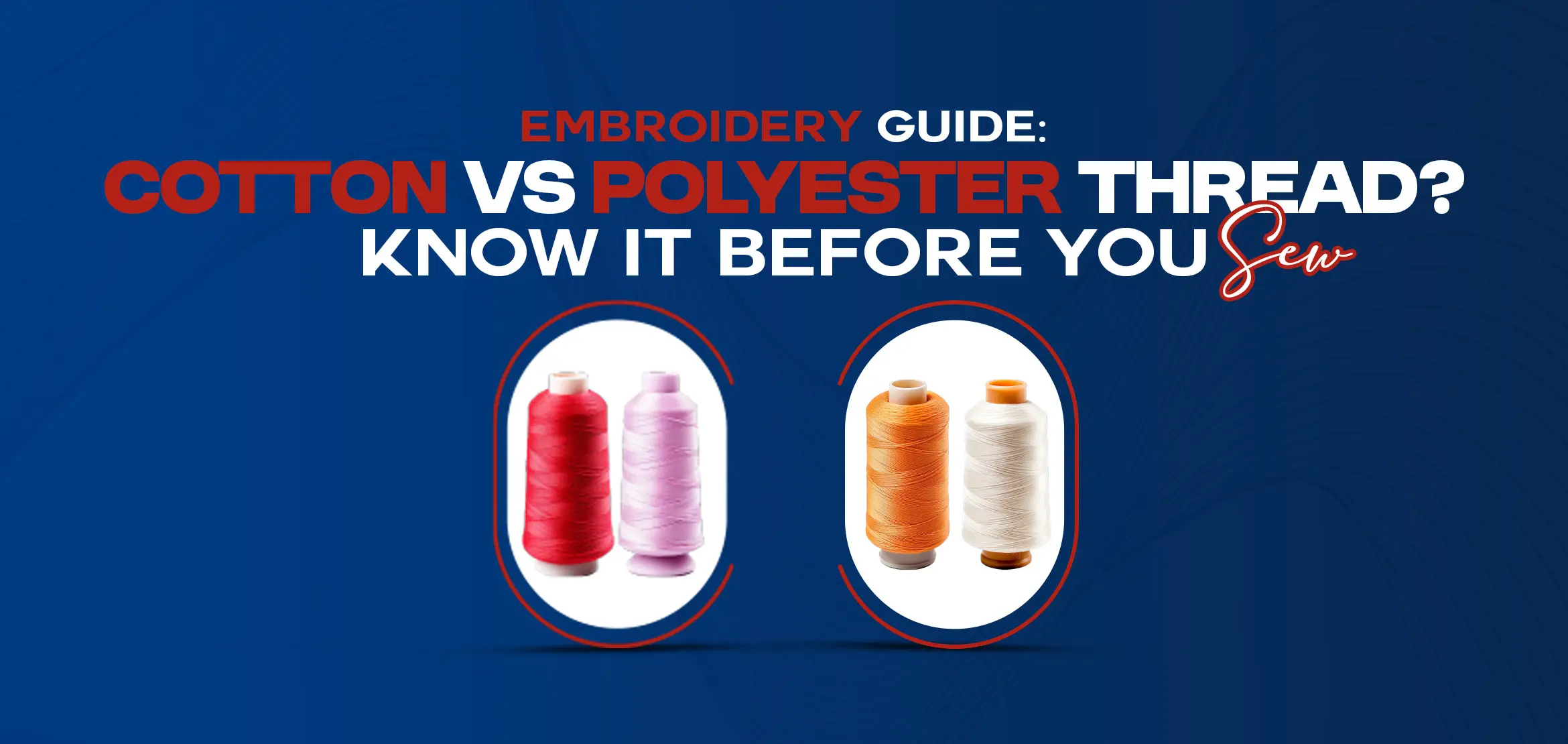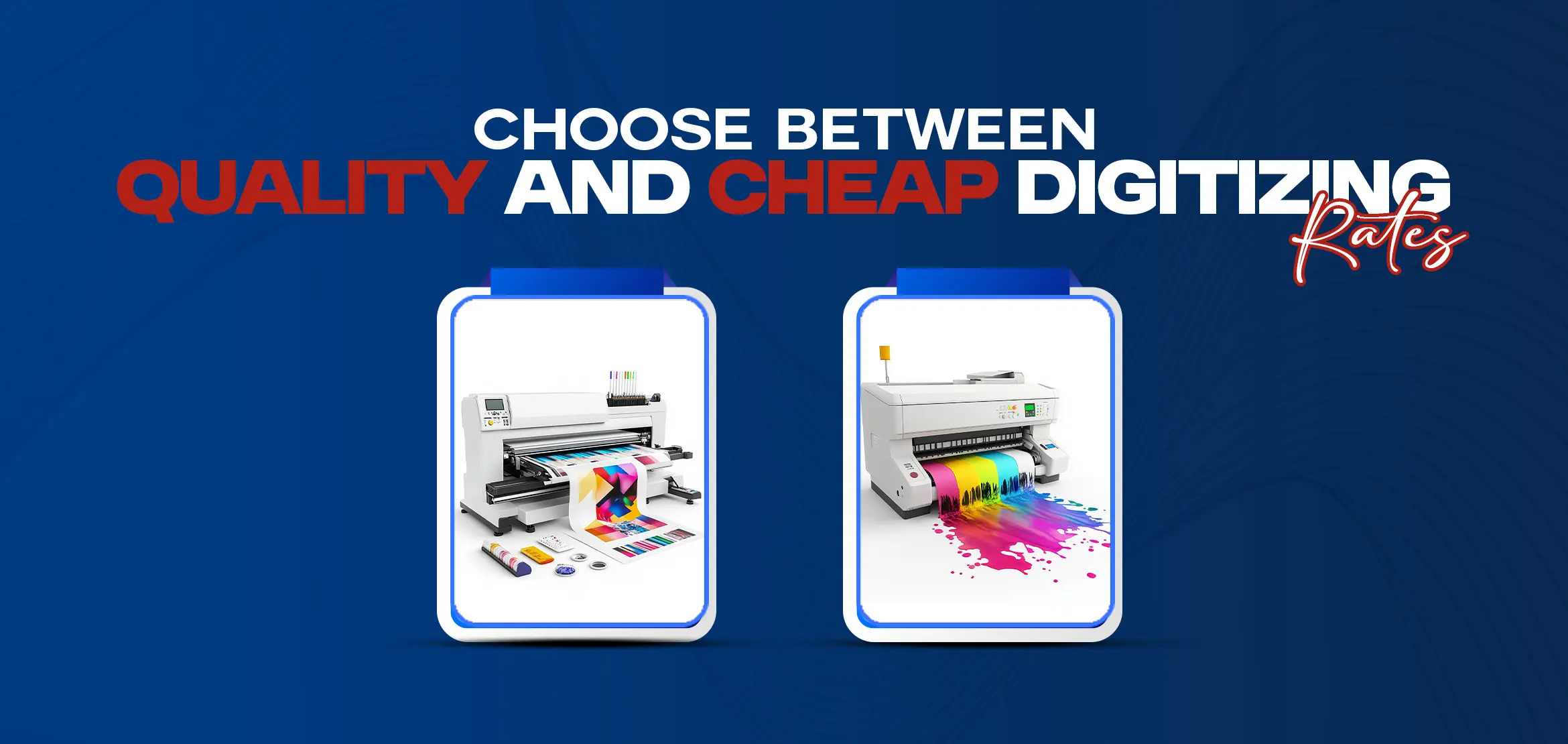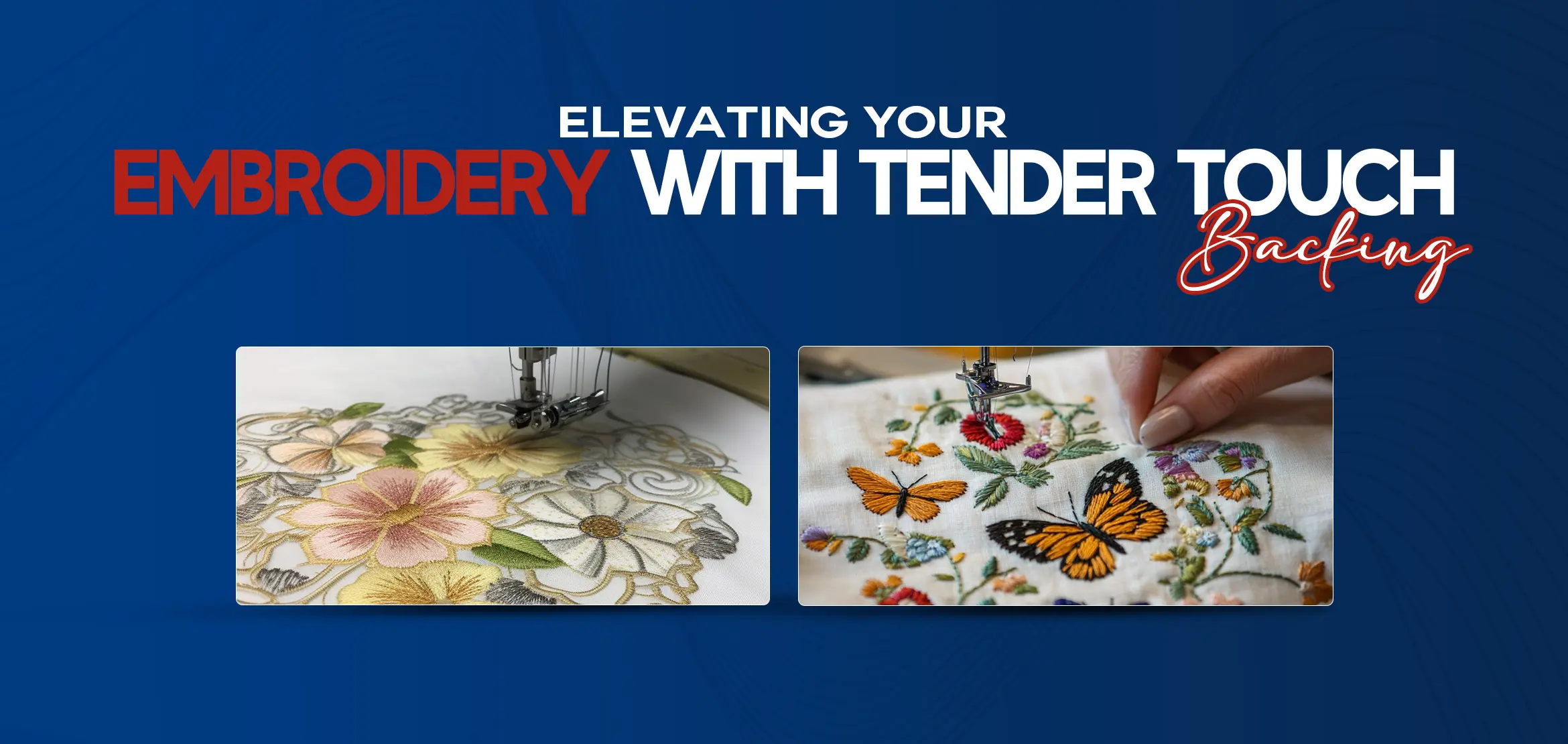
Embroidery Guide: Cotton vs Polyester Thread? Know It Before You Sew
Table Of Content
- An Overview of Cotton and Polyester Thread
- Cotton Thread
- Polyester Thread
- Difference: Cotton vs. Polyester Thread . . .
- Quick Comparison Between Cotton vs. Polyester Thread
- Is Cotton Better than Polyester?
- When to Use Polyester Threads ?
- Durability
- Colorfastness
- Variety
- Can I use Polyester Thread on Cotton Fabric?
- Is Cotton or Polyester Thread Better for Sewing
- Benefits Of Cotton and Polyester Thread
- Conclusion
Do you have an understanding of cotton vs. polyester thread? Or you've seen them all at the store, the little spools of thread with their colorful labels. You grab a few and toss them in your cart, feeling confident that you'll be able to sew up your project in no time. But before you do that, there's one question you need to answer regarding cotton vs. polyester thread. The choice of thread can make or break a project. It's important to understand the differences between these cotton and polyester threads and know when to use one. In this article, I'll cover all the fundamentals of cotton vs. polyester thread and explain why knowing your threads is important before you sew. Let's get started! When you take up a needle and thread to sew, one of the first decisions you'll have to make is which kind of thread you want to use. Cotton or polyester? Knowing the difference and when you should use each is important. Let's start with cotton. Cotton thread, derived from the cotton plant, is strong and absorbs moisture, so it's great for quilting and making clothes that need to breathe. It has a matte finish and blends in with the fabric for a natural look. Plus, because a cotton thread is biodegradable and recyclable, it's great for crafters who want a more eco-friendly alternative. Cotton might be your best bet if you're looking for a strong but soft thread that's perfect for seams that will be visible on the finished garment or quilt top. However, if you're sewing something that needs extra strength, such as an upholstery project, it's best to choose something more durable, like a polyester thread. A polyester thread is the "other" thread for all your sewing needs. It's often the more affordable choice in various colors and sizes. It's also resistant to shrinking, fading, and stretching and can withstand high temperatures, so it's an excellent choice for projects requiring extra durability. However, polyester can be tricky to work with because it tends to be quite slippery and can have some static electricity buildup when sewing. To help prevent this, you should invest in a spool net or wrap a rubber band near the end of the spool - both will help keep the thread in place. This type of thread also has an unnatural sheen which may not be ideal for certain projects. Ultimately, it's up to you to decide what kind of thread works best for your project. Cotton is more expensive but has some wonderful benefits if you take the time to understand it correctly. Polyester is more affordable and might prove useful for certain tasks. When selecting threads for your next project, you should know the differences between cotton and polyester threads. Both are made from natural fibers but are processed differently. Cotton threads are made from natural fiber and wound onto spools for use in sewing machines. Polyester threads are also made from a natural fiber base but with added synthetic elements for a stronger thread. The difference between cotton and polyester threads is their composition and function. Cotton is more durable and can withstand high temperatures, making it the preferred choice for quilting projects or other high-temperature applications such as clothing construction and patchwork. On the other hand, polyester is not meant to be exposed to high temperatures, so it's better used in applications that don't require much heat or drying time, such as hemming projects or repair jobs. 1: Durability: Cotton is much more durable than polyester, so it's ideal for projects that require repeated use or high levels of stress on the thread. 2: Wear Resistance: Polyester is more wear-resistant than cotton since its synthetic components make it less prone to fading or becoming frayed over time. 3: Shrinking & Fading: Cotton fibers are prone to shrinking and fading if exposed to too much heat, whereas polyester is resistant to shrinking and fading if washed in hot water and dried at high temperatures. It all depends on the project you're working on! If you're sewing heavier fabrics like canvas or leather, a polyester thread might be your better option, and that's because polyester is stronger than cotton so it can handle those heavier materials more efficiently. The polyester thread also resists fading more than cotton thread, which makes perfect sense for quilts or other sewing projects that will last a long time! You want to choose the right threads for the job when it comes to sewing. Polyester threads are a great choice if you're looking for something that holds up well and is relatively inexpensive. Here are a few factors to consider when deciding if polyester is the right thread for your project. Polyester threads offer great durability due to their strong, resilient nature. This makes them perfect for heavier fabrics or tougher materials like leather, canvas, or denim. The added strength also gives your projects extra strength and is less likely to snap during sewing or washing. Unlike cotton, polyester threads don't fade or shrink during washes and last longer with appropriate care, making them an ideal choice for projects that require vibrant colors like quilts and embroidery designs. Polyester threads come in an array of thicknesses and weights, meaning you can find one perfect for your project. Plus, some polyester threads can withstand temperatures higher than regular cotton threads without melting or fraying! Polyester may be the perfect option if you want a thread that can handle heavier fabrics while still providing a bright hue! Have you ever been out shopping for thread and felt overwhelmed by the choices? Cotton or polyester? Match the thread to the fabric, but it can take time to decide which one is the right choice. Should you choose cotton or polyester thread for cotton fabric in this case? The thing to remember is that cotton does not stretch; it's strong and has some give, but it won't stretch like polyester. If you choose a polyester thread for a project using a cotton fabric, there's a chance that the thread will stretch more than the fabric, and your project will only last for a while. That said, if you are doing a project where a four-way stretch is important, such as apparel construction or quilting, then polyester may be an acceptable option. For that particular application, polyester's strength and elasticity are advantageous. At the end of the day, when sewing with cotton fabric or any other natural fiber material, it's best to use 100% cotton thread; not only does it have the tensile strength to match your fabric type, but it also adds another layer of quality and durability to your finished piece. If you're starting with sewing, you might wonder which thread is better for your projects: cotton or polyester. The answer varies depending on the project but mostly on personal preference. Let's look at some of the pros and cons of cotton and polyester. One of the main benefits of using cotton thread is the natural fibers. Cotton is strong, soft and gentle on fabrics, making it a great choice for delicate materials like lace or silk. It's also easily available in most sewing stores. However, one downside is that cotton can shrink when washed or exposed to higher temperatures. This means that if you're using a dryer to finish your project, you should ensure the temperature isn't too high. The main benefit of using polyester thread is its durability; it won't break easily and can withstand higher temperatures than cotton. This makes it a good choice if your fabric needs frequent washing or ironing, as in many garment projects. It's also not prone to stretching or shrinking, unlike cotton thread. The downside is that polyester can be harder on fabrics than cotton; if you're working with delicate fabric like lace or chiffon, it may be best to use cotton thread instead. When it comes to sewing, investing in a good quality thread made from the right fabric type is important even when digitizing embroidery designs are done. Cotton and polyester are two of the most commonly used threads in the sewing world, but both have their benefits and drawbacks. Cotton thread is strong and durable yet slightly more expensive than polyester. Polyester thread, however, is a little more affordable and easier to locate but may break more easily.An Overview of Cotton and Polyester Thread
Cotton Thread
Polyester Thread
Difference: Cotton vs. Polyester Thread . . .
Quick Comparison Between Cotton vs. Polyester Thread
Is Cotton Better than Polyester?
When to Use Polyester Threads ?
Durability
Colorfastness
Variety
Can I use Polyester Thread on Cotton Fabric?
Is Cotton or Polyester Thread Better for Sewing
Benefits Of Cotton and Polyester Thread
Conclusion










